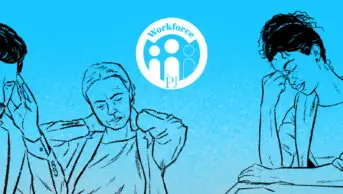In the same way as many NHS organisations, University Hospitals of Leicester (UHL) has faced sustained workforce challenges, particularly in recruiting and retaining specialist pharmacists at Agenda for Change Band 7. In March 2024, the vacancy rate stood at 56% (37 out of 58 whole-time equivalent [WTE] posts), in stark contrast with an average of 5.9% across the broader pharmacy department. This high number of vacancies created operational challenges, increasing the pressure on remaining staff and the quality of patient care.
To address this issue, we introduced ‘stay conversations’, a structured, proactive engagement intervention designed to better understand the lived experience of our specialist pharmacists. Rather than waiting to receive feedback from an exit interview, these conversations were aimed at exploring staff perspectives while in post, enabling early identification of issues and opportunities to improve staff retention and wellbeing.
The initiative involved one-hour, confidential conversations between each specialist pharmacist and a senior pharmacy leader not directly responsible for their line management. They were aimed at complementing, rather than duplicating, existing appraisal or supervision processes. This separation from line management was intentional, to encourage openness and reduce the perceived risk of raising concerns. The format was structured but flexible, focusing on themes such as work environment, relationships within teams, career aspirations and overall job satisfaction.
Of the 48 eligible specialist pharmacists invited, 44 conversations were completed — 4 members of staff were unavailable owing to maternity leave, secondment or personal choice. The format and questions were shared in advance and feedback was anonymised, thematically analysed and shared with area leads. The findings were used to undertake targeted action planning, with timelines and responsibilities agreed collaboratively with relevant team leaders. This helped ensure that actions were feasible, aligned with existing priorities and reflected the views of staff, and that there was ‘buy in’ from relevant team leads. The action plans were shared with specialist pharmacists, closing the feedback loop and demonstrating that their contributions were being taken seriously.
To evaluate the initiative, we invited all participants to complete an anonymous follow-up survey. Of the 44 participants, we received 25 responses, representing a 57% response rate. Feedback was overwhelmingly positive:
- 96% agreed or strongly agreed that they felt listened to;
- 92% agreed or strongly agreed that they felt confident about raising concerns;
- 88% agreed or strongly agreed that they found the conversation useful;
- 92% wanted the process repeated with varying responses on frequency and with whom the conversation would be carried out.
Several respondents commented that the process helped them feel valued and respected. Others appreciated the opportunity to share ideas and concerns in a safe, constructive setting. Several individuals were signposted to wellbeing resources, mentoring or career development opportunities as a direct result of the conversations.
Senior leaders who facilitated the stay conversations also reported valuing the process. They described gaining deeper insight into workforce pressures, recognising early signs of dissatisfaction. They also allowed triangulation with other formal and informal data sources, allowing leaders to consider how the lived experience of this staff group aligned with other information and whether that was being impacted by work seeking to improve staff experience. Importantly, the conversations helped strengthen relationships between staff and leadership and demonstrated a visible commitment to listening and acting on feedback.
By October 2024, the specialist pharmacist vacancy rate had reduced to 22% (12/54 WTE), the lowest level in three years. Ongoing recruitment activity should result in this improving further, potentially reaching < 5% by summer 2025. While it would be unrealistic to attribute this improvement solely to the stay conversations, the intervention played a significant role within a broader programme of work focused on workforce wellbeing, development and retention. This approach supports the ambitions set out in the ‘NHS long-term workforce plan’, which calls for strategies to “train, retain, reform” the healthcare workforce1.
Based on our experience, we plan to expand the use of stay conversations across the pharmacy workforce. Future actions include:
- Offering three-month stay conversations for new starters;
- Repeating stay conversations with specialist pharmacists to track progress;
- Providing optional conversations to staff who were unsuccessful in internal recruitment processes;
- Ensuring regular follow-up to review progress on agreed actions;
- Exploring the value of extending the approach to other staff groups.
We also intend to monitor long-term outcomes, including retention rates, staff satisfaction and the implementation of agreed actions. The sustainability of this approach will depend on ongoing leadership commitment, time investment and the ability to demonstrate that feedback leads to change.
In summary, stay conversations provided a simple, low-cost and high-impact tool for strengthening staff engagement, identifying areas for improvement and supporting a culture of open dialogue. By creating protected time and space for reflective conversations, we were able to build trust, identify solutions and take early action to support our workforce. This approach is replicable in other settings and offers a practical example of compassionate, values-based leadership in action.
Leila Bahadur, principal pharmacist for education and training, University Hospitals of Leicester NHS Trust
Duncan Macdonald, associate chief pharmacist, University Hospitals of Leicester NHS Trust
- 1.NHS long-term workforce plan. NHS England. June 2023. Accessed June 2025. https://www.england.nhs.uk/publication/nhs-long-term-workforce-plan/


